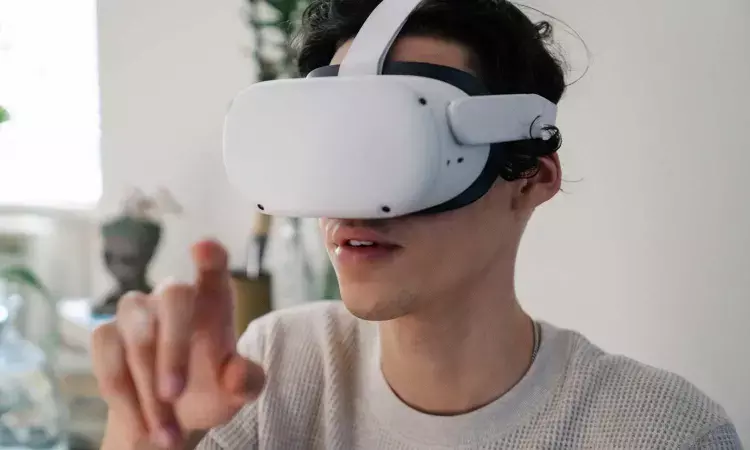- Home
- Medical news & Guidelines
- Anesthesiology
- Cardiology and CTVS
- Critical Care
- Dentistry
- Dermatology
- Diabetes and Endocrinology
- ENT
- Gastroenterology
- Medicine
- Nephrology
- Neurology
- Obstretics-Gynaecology
- Oncology
- Ophthalmology
- Orthopaedics
- Pediatrics-Neonatology
- Psychiatry
- Pulmonology
- Radiology
- Surgery
- Urology
- Laboratory Medicine
- Diet
- Nursing
- Paramedical
- Physiotherapy
- Health news
- Fact Check
- Bone Health Fact Check
- Brain Health Fact Check
- Cancer Related Fact Check
- Child Care Fact Check
- Dental and oral health fact check
- Diabetes and metabolic health fact check
- Diet and Nutrition Fact Check
- Eye and ENT Care Fact Check
- Fitness fact check
- Gut health fact check
- Heart health fact check
- Kidney health fact check
- Medical education fact check
- Men's health fact check
- Respiratory fact check
- Skin and hair care fact check
- Vaccine and Immunization fact check
- Women's health fact check
- AYUSH
- State News
- Andaman and Nicobar Islands
- Andhra Pradesh
- Arunachal Pradesh
- Assam
- Bihar
- Chandigarh
- Chattisgarh
- Dadra and Nagar Haveli
- Daman and Diu
- Delhi
- Goa
- Gujarat
- Haryana
- Himachal Pradesh
- Jammu & Kashmir
- Jharkhand
- Karnataka
- Kerala
- Ladakh
- Lakshadweep
- Madhya Pradesh
- Maharashtra
- Manipur
- Meghalaya
- Mizoram
- Nagaland
- Odisha
- Puducherry
- Punjab
- Rajasthan
- Sikkim
- Tamil Nadu
- Telangana
- Tripura
- Uttar Pradesh
- Uttrakhand
- West Bengal
- Medical Education
- Industry
Virtual reality may reduce anxiety among caregivers of children having surgery

USA: A recent study has demonstrated a significant reduction in anxiety experienced by most parents or caregivers when their child undergoes surgery when using virtual reality (VR) compared to standard of care. The research was presented at the ANESTHESIOLOGY® 2023 annual meeting.
"Virtual reality may be a reliable and effective tool to alleviate the anxiety experienced by most parents or caregivers when their child undergoes surgery," the researchers wrote.
“When a child has a medical procedure, it is often emotionally unsettling for not just the patient, but the entire family,” said Thomas J. Caruso, M.D., Ph.D., FASA, senior author of the study and clinical professor of anesthesiology, perioperative and pain medicine at Stanford University, California. “By providing family-centered care, we aim to treat not just the patient, but also caregivers, who experience quite a bit of anxiety before, during and after surgery when a loved one is undergoing a procedure. Our findings demonstrated a significant reduction in anxiety when using VR, compared to our standard of care.”
Approximately 74% of caregivers experience anxiety prior to their child’s surgical procedure. Despite this, interventions to treat caregiver anxiety have only been implemented in a few hospitals, the authors note.
Caregiver anxiety can also exacerbate the distress experienced by the child before surgery. Increased child anxiety contributes to uncooperative anesthetic inductions, prolonged recovery, increased postoperative pain and delirium, and decreased patient satisfaction.
The study included 26 caregivers of children undergoing noninvasive or surgical procedures. The VR intervention involved guided, mindfulness meditation using a commercially available VR headset. The mindfulness application that caregivers experienced was developed by the Stanford Chariot Program, a clinical and translational research program that develops novel uses for immersive technologies in pediatric health care. Computer-generated imagery of a nature-based landscape was projected to promote relaxation through both visual and auditory prompts.
Fifty-four percent of the caregivers received the VR intervention, while the 46% who did not were asked to wait and rest in the waiting area with access to refreshments, which is considered the hospital’s “standard of care.” Participants in the VR group were instructed to use the VR intervention at the start of their child’s procedure for six minutes. Caregivers’ anxiety levels were evaluated using several self-reported surveys at the start of their child’s procedure and immediately after the intervention. To assess satisfaction with the intervention, researchers asked the VR group to complete a brief, four-question satisfaction survey.
Prior to receiving the VR intervention, the average anxiety level for caregivers in the VR group was 56.5, while the average for the standard of care group was 50.3 on a visual analog scale measuring degree of anxiety from 0-100. After receiving the VR intervention, the average anxiety level for caregivers in the VR group dropped to 33.1, while the average for the standard of care group remained relatively the same at 51.4. Of the 14 caregivers who completed the VR satisfaction survey, 12 of them reported either being satisfied or strongly satisfied (i.e., a score of 4 or above on a 5-point scale) across all four satisfaction domains.
“Immersive technologies, such as virtual reality, offer new, non-pharmacologic treatment options for anxiety relief,” said Dr. Caruso. “Given the lowering costs of VR and its commercial availability, the results of this study suggest that hospitals seeking to provide family-centered care may consider VR as an effective, anxiety-relieving option for caregivers.”
Dr Kamal Kant Kohli-MBBS, DTCD- a chest specialist with more than 30 years of practice and a flair for writing clinical articles, Dr Kamal Kant Kohli joined Medical Dialogues as a Chief Editor of Medical News. Besides writing articles, as an editor, he proofreads and verifies all the medical content published on Medical Dialogues including those coming from journals, studies,medical conferences,guidelines etc. Email: drkohli@medicaldialogues.in. Contact no. 011-43720751


